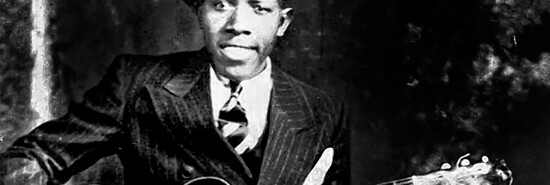
The phantom king of the Delta blues
Michael Taube
Very little was once known about the king of the Delta blues. Many of these gaps have gradually been filled in. Robert Johnson was born in 1911 in Hazlehurst, Mississippi. He rose like a phoenix in the tough, competitive juke joints and street corners of the Mississippi Delta. His talent as a guitarist, singer, and songwriter, which he claimed came from a deal with the devil at a local crossroads, became mythical. He drank and womanized to the point that excess was sweating buckets alongside him. He died of mysterious circumstances in Greenwood, Mississippi, in 1938, an early member of the dreaded “27 club” that counts Jimi Hendrix, Janis Joplin, and Kurt Cobain as charter members. His remains may have been placed in one of several grave sites or in a potter’s field.

The mysteries surrounding the great bluesman could have been put to rest much earlier had Robert “Mack” McCormick’s Biography of a Phantom: A Robert Johnson Blues Odyssey, edited by John Troutman, seen the light of day several decades ago. One of the most highly anticipated releases in blues music history, this newly released work by the eccentric musicologist and folklorist, who died in 2015, had sat as a manuscript for what seemed like an eternity. McCormick began to study Johnson as a Smithsonian Institution field researcher. His fieldwork occurred between 1970 and 1973, and several drafts were written in 1975. He interviewed people who knew the blues guitarist, including friends, family members, and fellow musicians. Anticipation grew. Alas, his work was never published. The journey to its unlikely publication is as fascinating as the long-awaited book itself.
THE SHALLOW DEPTHS OF LANA DEL REY
According to a November 2008 piece by Frank DiGiacomo in Vanity Fair, a significant part of the reason could have been Steve LaVere. The record collector/researcher had located one of Johnson’s half-sisters, Carrie Thompson, “a year or so after McCormick had located Johnson’s kin.” She allowed LaVere to copy two previously unknown Johnson photos. It didn’t stop there. “Under the assumption that she was Johnson’s next of kin — the second half-sister had reportedly died by then, though Johnson’s mother and other half-siblings were still alive,” wrote DiGiacomo, “she also signed an agreement that transferred to LaVere ‘her right, title and interest, including all common law and statutory copyrights’ to the two photographs, as well as a handwritten note Johnson had purportedly composed on his deathbed and, most important, all musical works and recordings.”
LaVere now had “first right of refusal for any subsequent Johnson-related photos or documents that might be found.” He became Thompson’s agent and could start “collecting royalties in connection with any and all works of Robert L. Johnson.” He used this as leverage when threatening to sue anyone attempting to stake a claim to his blues-lovin’ goldmine. McCormick, who already had an arrangement with the half-sisters, contacted Columbia. The dispute caused the Robert Johnson: The Complete Recordings box set to be delayed for 15 years. It was eventually released in 1990, and LaVere received the credit.
In a 2002 Texas Monthly interview, McCormick said he had abandoned the book project. “It ain’t happening anymore. I lost interest.” Fortunately, Troutman, the editor of this new volume, was one of several music historians and aficionados who never lost interest. A curator of American music at the Smithsonian National Museum of American History, he went through McCormick’s archive (located in the same building) and incorporated multiple drafts into the final version. “He wrote Biography of a Phantom as a crime thriller targeted to a general audience and inspired by Truman Capote’s 1966 nonfiction murder novel In Cold Blood,” noted Troutman.
“From the outset, Johnson’s life presented a mystery,” McCormick writes. “His songs continually made reference to towns along the Mississippi River, but they’d been recorded in Texas, in two different cities eight months apart. People went to Dallas and San Antonio asking about him, but they learned nothing. For a number of years, it was believed that he’d been living in San Antonio and was killed there. But official records gave no support. Others searched for him in Vicksburg, Rosedale, and Memphis — riverside towns, like Friars Point, mentioned in his songs. They tried Hot Springs and West Helena for the same reason. The search even extended to Europe.” But even as musicians and others were interviewed, and some pieces of the puzzle came together, “the essential mysteries remained.”
McCormick crafted a list of possible clues within Johnson’s music: Towns such as Chicago, Memphis, and Vicksburg, three states (Arkansas, California, and Tennessee), and three countries (China, Ethiopia, and the Philippines, which were all mentioned in his song, “I Believe I’ll Dust My Broom”). “In addition,” he noted, “there were three words from which some geographic inferences could be drawn: icicles, shrimp, and tamales.”
A trip to Friars Point, Mississippi, was fraught with difficulty. Many locals avoided the discussion, “not wanting any part of someone who was looking for somebody.” A man with a walking stick pointed in the direction of another man “slumped back of the steering wheel” in an old Ford. “But I don’t know nothing about what became of him except what they say that he got killed. Believe I heard he got poisoned. You know how people is. Jealous, you know. Women was crazy over that boy. It was down the country somewhere he got killed. Didn’t he have some little gal here?” This led to a discussion about a girl named Betty, who could have been the inspiration for a line in his song “Traveling Riverside Blues,” “She got a mortgage on my body now, and a lien on my soul.”
On the outskirts of town, he spoke with a woman who had heard Johnson’s name mentioned at the grocery store “not 30 minutes before.” After overcoming her initial apprehension, and with a memory McCormick described as “blurred,” she told him Johnson had likely been a boarder at her home for two weeks. She knew him as “Bob” and said he’d fallen in love with a girl. “He stayed right in this room here, and his guitar was always over there in that far corner, if it wasn’t in his hands.”
McCormick’s adventures often had fascinating plot twists. “Johnson was a stranger in the place where he had died,” located near Greenville, Mississippi.
Johnson met a man in Hughes, Arkansas, who had apparently hired Johnson to play many times. He met other Johnsons, some of them the great bluesman’s kin. Commerce, Mississippi, residents largely knew him as “Robert Spencer.” Blues musicians who knew Johnson, including Son House, Robert Lockwood Jr., and Roosevelt Sykes, all “talked around him, not about him.” Johnson’s womanizing was legendary. “It’s amazing to me he lived as long as he did,” one man said. “Considering the risks he took, and the way he was, he lived longer than he had a right to expect.”
McCormick also went to Hazlehurst, “a fairly prosperous-looking place,” and met Virgie Mae Cain. She said Johnson “was daddy to my oldest boy,” Claud. While McCormick encountered many faulty or misinformed accounts, this astonishing story was the God’s honest truth. Cain and Johnson were together for nine months. He was apparently a “private person” who never wrote down his musical lyrics and came back in 1933 to visit his son.
The consensus was that Johnson was murdered with “bad whiskey” containing some type of poison. The cause? “It was over some woman,” a man said. The killer’s identity remains a mystery.
CLICK HERE TO READ MORE FROM THE WASHINGTON EXAMINER
Biography of a Phantom creates a fascinating portrait of Johnson that is mostly unresolved and contains several dark and deeply personal undertones. His haunting music included images in which “stones blocked his passway, women taunted him, a hellhound trailed him,” while his “favorite themes were loneliness, wandering, all the harsh disappointments and the brief passions of mortality.” McCormick suggested Johnson’s “mysterious early death became part of an evocative, personal legend that urges us to listen intently and to grow curious about the man. His songs provoke a sense of wonder.”
Michael Taube, a columnist for four publications (Troy Media, Loonie Politics, National Post, and Epoch Times), was a speechwriter for former Canadian Prime Minister Stephen Harper.
